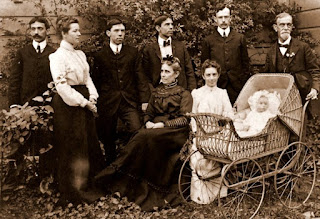There are two distinct ways in which members of a society may think about their inclusivity in place and time. One way, genealogy, takes its bearings from lines of family descent. The other, generation, finds its units of measurement in cohorts of people born at approximately the same time. These two approaches have something in common: they both use biological relationships as a way of thinking about social relationships.
But the differences between them are equally clear. Genealogy provides a vertical sense of belonging that defines the people of the present in terms of their ancestors.
Generation is horizontal: it constructs a community of coevals. Genealogy concentrates on succession, whereas generation emphasizes simultaneity. Genealogy attaches importance to kin connection; generation potentially transcends kin.
Meeting Places
It did not take long for me to realise that my random collision with Suffolk in the early 1980s might run deeper than a one-off scientific project. The first mental alert came when I read in Rowland Parker's book 'Men of Dunwich' that one, William Belamy, together with twenty other mariners of Dunwich, withheld his taxes as a protest against the chronic inefficiency of the town's government. This minor local rebellion happened in 1287. The possibility of Suffolk being a family meeting place could not be ignored when I learned that at this time Kemps (my mother's family) were Domesday property holders in the town and surrounding countryside. Now, after decades spent unravelling many skeins of family history, starting with the birth of my grandfather Kemp in Aldeburgh a few miles from Dunwich, I can see that the Bellamy connection was through the Flemmings, who came to East Anglia in the 13th century in the pay of the Count of Flanders. The Kemps had arrived much earlier from Normandy and were established as henchmen of the local Suffolk aristocracy prior to the Norman Conquest.
Now, it still surprises me to think that I lived for so much of my life without roots in family and place, although I have always had a keen interest in history. With respect to place, the question 'Where do you come from?' has to mean something again. These days people live everywhere, which is the same as living nowhere. Like a vitamin deficiency, a contact deficiency with one's ancestors weakens the body, the mind, and the spirit. In fact, it strikes me that the great challenge of our times is to rebuild connection into our self- conscious lives by reaching out to others and by being part of something larger than ourselves.




Comments
Post a Comment